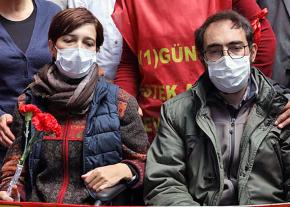Criminalizing dissent in Turkey
In his column for Inside Higher Ed, explains the backdrop to Turkey's crackdown on academic freedom and the international defense campaign.
PEACEFUL PROTEST carries no guarantee against violence. In mid-May, Recep Tayyip Erdoğan, the president of Turkey, came to the United States to meet with Donald Trump, who had made haste to congratulate him on winning a referendum in April. Its provisions would--according to the Venice Commission of the Council of Europe--undercut "the model of a democratic presidential system based on the separation of powers" and thereby "risk degeneration into an authoritarian presidential system."
By most standards, the risk was already a fait accompli, though the referendum (which had passed narrowly and with voting irregularities) further tightened the screws. What it could not do was prevent critics from assembling outside the Turkish ambassador's residence in Washington. Erdoğan's bodyguards responded by attacking the demonstrators--punching them, throwing them to the ground, kicking them--and also managed to injure D.C. police and Secret Service agents who got in the way.
In fact, things were just picking up where they'd left off one year earlier, during Erdoğan's appearance at the Brookings Institute, a few blocks away. "His security detail abused Brookings's hospitality," says the account from April 2016 on the institute's website. "They picked fistfights with demonstrators and attempted to evict Turkish journalists," and found themselves threatened with a cancellation of the event "if they did not desist with their thuggish behavior."

The whole experience was unsettling to think-tank staff, who are not often called on to serve as bouncers. "The president and his security detail clearly failed to recognize the protests for what they were," reads Brookings's assessment of the event: "a natural and accepted activity in a democracy rather than an imagined conspiracy against Turkey." The same could be said about the skirmish in May--although chiding a swarm of goons for failing "to recognize...natural and accepted activity in a democracy" seems to carry politeness a little too far.
INSIDE HIGHER Ed has reported on the campaign of repression against Academics for Peace, an organization of Turkish scholars and educators with the temerity to criticize the state's ongoing violence against the country's Kurdish population. The situation is worsening. On December 5, hearings began in Istanbul for 36 of the 148 signatories scheduled for trial through May 2018. If convicted, they face prison sentences of up to seven-and-a-half years.
Currently there is an open letter appealing for academics abroad "to show their solidarity by joining delegations to Turkey as international observers at the trials and by sending financial support." It has already been endorsed by numerous professors and is gathering more signatures here.
A paper appearing in the journal Critical Studies on Terrorism earlier this year acknowledges that "prison time has often served as punishment for academics challenging the state's narrative on the Kurdish Question or the Armenian Genocide, which together constitute the 'third rail' in Turkish politics." But prosecution of such thoughtcrimes tended to be "sporadic and unsystematic" before the Academics for Peace petition circulated in January 2016, drawing 1,128 signatories. Among them were two of the three authors of the paper, which, if not disinterested, is certainly informative. (All three now work outside Turkey.)
The state's response was to broaden the definition of terrorism. In Erdoğan's words, "It might be the terrorist who pulls the trigger and detonates the bomb, but it is these supporters and accomplices who allow that attack to achieve its goal. The fact their title is politician, academic, writer, journalist or head of a civil society group doesn't change the fact that individual is a terrorist." In fact, the petition called on the Turkish state to honor its own treaties and obey international law. Really bloodcurdling stuff.
While awaiting trial on terrorism charges, signatories often faced the loss of jobs and passports, as well a wave of attacks in mass media--leading, in turn, to death threats from enraged social-media users. It may bear mentioning that Erdoğan has also prosecuted people for criticizing him via Twitter.
The paper in Critical Studies on Terrorism posits the attack on Academics for Peace as an instance of "a broader wave of 'democratic retrenchment' across the [globe] since the 2000s," leading to authoritarian regimes that hold elections to legitimate themselves while concentrating power in the hands of "a 'dominant leader' through the instrumentalisation of state apparatuses and the ruling [party's] hegemony over civil society and the media."
The recent open letter in support of the persecuted Turkish academics has been endorsed by, at last count, seven Nobel laureates, three Fields medalists and two Pulitzer Prize recipients. Solidarity organizers tell me the signatures will be periodically updated on the English-language part of the Academics for Peace site, along with other statements of support and news about developments in the case.
Academics for Peace is soliciting video statements by international colleagues who condemn the persecution, such as one by Steven Pinker. A group of academics, trade unionists, artists and politicians from abroad is being assembled to attend the hearing scheduled for January 18. To inquire about submitting a video, observing the hearing or helping to finance the delegation, contact the organizers.
Financial donations in support of the persecuted academics themselves are also urgently welcome and may be made here.
First published in Inside Higher Ed.


